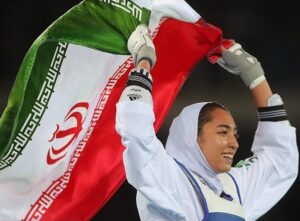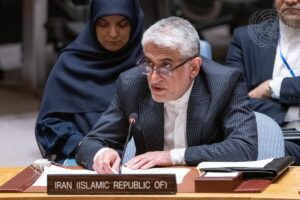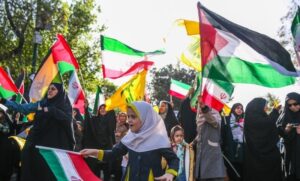Stimson’s “Syria Series”, closed roundtables under Chatham House Rule for renowned regional and international experts, aims to unpack the complexity and enhance understanding of the policies and perceptions of players in the Syrian conflict.
In March, the Syrian crisis entered its 11th year. The resulting refugee crisis remains the largest in the world, Despite the geo-political impact of the conflict, today the war does not get sufficient policy and media attention in part due to the international focus on the Ukraine war and other crises. Against this backdrop, Stimson started “Syria Series”, closed roundtables under Chatham House Rule for renowned regional and international experts to unpack the complexity and enhance understanding of the policies and perceptions of players in the conflict.
The first virtual event gathered experts and officials from the EU, Germany, Iran, Russia, Switzerland, Turkey, and the US to share insights on the following issues: 1) The scope for the expected Turkish military operation in Northwest of Syria, 2) Iran’s increased influence in Syria, and its relationship with Turkey and Israel, and 3) the potential for increased hostilities between the US and Russia. The roundtable was moderated by Kawa Hassan, Executive Director Stimson Europe, Director MENA Program and Senior Fellow, and Abdulla Ibrahim, Non-resident Fellow, Stimson MENA Program.
US and Russian experts highlighted the common interest to maintain the status quo and avoid confrontation in Syria. Airstrikes around Tanaf were not an escalation, as a Russian expert said. The scope of the Turkish operation is likely to be limited to Tel Rifat, and that is expected to upset Tehran, Damascus, and Syria Democratic Forces (SDF) more than Washington DC and Moscow. An insurgency against Turkey is more expected if the operation has gone beyond Tel Rifat. The increased Iranian influence after Ukraine war is limited to the political sphere and to some extent military, but in coordination with Russia. Iran does not have economic flexibility and capacity to expand beyond the current limits. Failure of renewing the JCPOA negotiations and more Israeli support of Ukraine might increase Iran-Israel confrontations inside Syria to another level.
A narrow scope for the expected Turkish military operation in Northwest of Syria
“The announced military operation is likely to be imminent but limited in scope to the Northwest,” said a Turkish expert. The anticipated operation addresses the Turkish counter terrorism concerns and satisfies the Russian and US worries against upsetting the status quo. The strategic objectives for Turkey are to secure connections to Aleppo through Tel Rifat, and to reduce the chances for future attacks on Turkey from these areas. Another objective for Turkey is to capture locations that are likely to be occupied by Iran in case of any future Russian withdrawal. Both Iranian and Turkish experts agreed that the upcoming operation is likely to further stress the Turkish-Iranian relations in Syria and in Iraq. “While Iran understands the Turkish security concerns, it is suspicious about the real Turkish intentions from advancing deeper towards Aleppo,” said an Iranian expert. Tehran expects more pressure on Damascus and troubles for Iranian forces in Syria to follow. A nightmare scenario also includes Israeli pressures in the South of Syria, simultaneously with Turkey from the North. “Iran fears to be sandwiched between Turkey and Israel,” said the Iranian expert.
On the timing of the operation, all experts agreed on the connection between Ukraine and Syria as Turkey is partially leveraging its importance to both US and Russia in Ukraine to act in Syria with less restrictions. Both US and Russian experts noted that their capitals would probably not resist a small operation but will be concerned about a large scale one. A definition of the scale was not given, which leaves it open to interpretations. For the US, Turkey is a key NATO ally and central for the US in maintaining status quo in Syria for the long term. For Russia, Turkish security concerns are legitimate, and the timing of the operation is connected to recent killings of Turkish soldiers in Syria, in addition to the preoccupation of Russia in Ukraine. In addition, Turkey is the main channel for Russia to the global economy, and Moscow does not wish for a confrontation with Ankara like in Idlib in 2020.
“The consequences of the operation are already dire before it even started,” noted a Syrian expert. The threat of the military operations has negatively affected the lives of thousands of IDPs in the areas under expected attack, whom they cannot go back to their homes nor to anywhere else. Even a limited operation is likely to spark an insurgency in the Northwest, and probably attacks on Turkey, warned Iranian and Syrian experts. Russian and US experts did not expect major disruption in the status quo if the operation is limited to Tel Rifat, compared to a big and long operation that reaches to Manbij and probably beyond. A Russian expert suggested that a larger operation might bring SDF closer to Damascus. A Turkish expert agreed, but he did not expect Damascus to be relevant to the Turkish calculations unless it is able to take over the SDF in locations close to the Turkish borders.
Regardless of the scale of the operation, it will present a symbolic defeat for SDF and Damascus, noted a Russian expert. Losing more land controlled by SDF even in the Northwest, will weaken the Autonomous Administration in Northeast of Syria (AANES), as it will show it cannot protect its people. An operation will also weaken the reformers within the AANES and empower the hardliners. As more resources will go to security and less to development and education, the efforts for modernization of governance and opening the region to its neighbors will be slowed down. The economic consequences might be also felt in terms of sending the wrong signals to foreign investors following the US issuance of a General License that clears the North of Syria from sanctions. “Who will come to invest in a region that is permanently under threat of attacks,” questioned the Syrian expert.
Iran is worried of Israel and Turkey, and it coordinates with Russia in Syria
“Increased Iranian influence in Syria after the Ukraine war is limited to the political sphere more than the military or economic ones,” said an Iranian expert. Reports on Russia handing over bases to Iranian forces is a matter of coordination, as both share an interest in providing security to the Syrian Government. The Russian experts confirmed that Russia delegated some of the security functions to Iran to be able to focus on Ukraine, as Syrians do not have enough resources to meet the challenges. Russia expects to see more coordinated Iranian presence in the security sphere, but that does not include Iranian control of borders. Russia still respects Israel’s security concerns, despite the growing discomfort with its support to Ukraine. More Israeli military support to Ukraine might anger Moscow and affects its efforts to reduce the Iranian presence in the South. The failure to renegotiate a new JCPOA also might usher an era of increased tensions with Israel in Syria and beyond.
An American expert expected that Iran will be central to the anticipated visit of President Biden to the region. He further elaborated by saying, “The US and Israel have close views on the destructive role of Iran in Syria and the region in terms of military infrastructure, proxies, and illicit drug trade through Jordan.” The debates on Iran in Israel along with the appointment of a new chief of the Israeli Army who sees confronting Iran in the region as essential to its mission will be key to security dynamics in Syria. The current Turkish operation in Iraq also touches upon Iran’s influence and targets its proxies. Consequently, Tehran is already mobilizing its proxies, arming them to confront Turkey in both Syria and Iraq.



